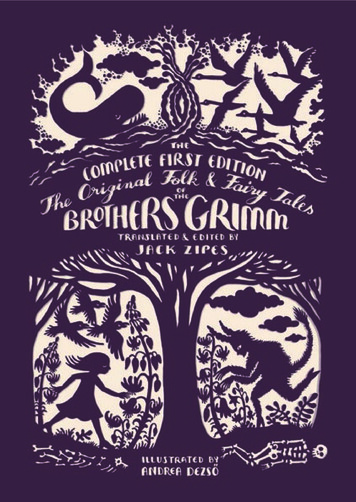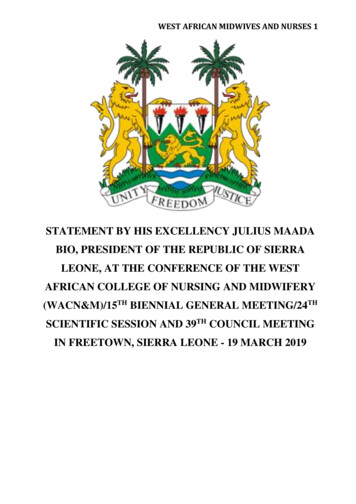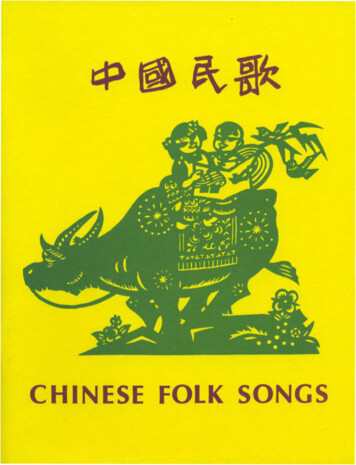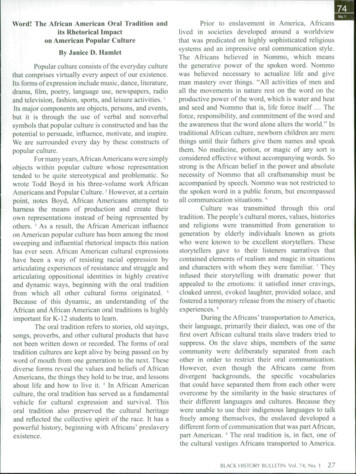
Transcription
WEST AFRICANFOLK-TALES
NATIVE CHILDREN READY FOR A STORY
WEST AFRICANFOLK-STORIESCOLLECTED AND ARRANGED BYW. H. BARKERANDCECILIA SINCLAIRYESTERDAY’S CLASSICSCHAPEL HILL, NORTH CAROLINA
Cover and arrangement 2007 Yesterday’s Classics, LLC.This edition, first published in 2007 byYesterday’s Classics, an imprint ofYesterday’s Classics, LLC, is an unabridgedrepublication of the work originallypublished by C. M. S. Bookshop in 1917.For the complete listing of the books thatare published by Yesterday’s Classics,please visit www.yesterdaysclassics.com.Yesterday’s Classics is the publishing armof the Baldwin Online Children’sLiterature Project which presents thecomplete text of hundreds of classic booksfor children at www.mainlesson.com.ISBN-10: 1-59915-231-2ISBN-13: 978-1-59915-231-8Yesterday’s Classics, LLCPO Box 3418Chapel Hill, NC 27515
CONTENTSANANSI, OR SPIDER, TALESI. HOW WE GOTTHENAME“SPIDER TALES” . 1II. HOW WISDOM BECAMEPROPERTYIII. ANANSIANDIV. THUNDERV. WHYTHEMOVESVI. TITOF THEHUMAN RACE . 4NOTHING .7ANDANANSI .10LIZARD CONTINUALLYHISFORTHEHEAD UPANDDOWN . 15TAT .19VII. WHY WHITE ANTS ALWAYSHARM MAN’S PROPERTY . 23VIII. THE SQUIRRELAND THESPIDER .27IX. WHY WE SEE ANTS CARRYINGBUNDLESASBIGX. WHY SPIDERSFOUNDIN THEASARETHEMSELVES . 29ALWAYSCORNERSOFCEILINGS . 33
XI. ANANSITHEXII. ADZANUMEEBLIND FISHERMAN . 37ANDHER MOTHER .39XIII. THE GRINDING-STONEGROUND FLOURTHATBY ITSELF .43XIV. “MORNING SUNRISE”. 47XV. WHYTHESEA-TURTLECAUGHT BEATSITSITSWHENBREASTWITHFORELEGS .49XVI. HOW BEASTSFIRST CAMEANDSERPENTSWORLD . 51INTO THEXVII. HONOURABLE MINŪ . 56XVIII. WHYTHERECEIVEMOONTHEIRAND THELIGHTSTARSFROM THESUN .58MISCELLANEOUS TALESXIX. OHIAXX. HOWAND THETHETORTOISE GOTXXI. THE HUNTERXXII. KWOFITHIEVING DEER . 65AND THEAND THEITSSHELL . 73TORTOISE . 76GODS .80
XXIII. THE LIONAND THEXXIV. MAKU MAWUANDWOLF. 82MAKU FIA“I WILL DIE GOD’S DEATH”ORAND“I WILL DIE THE KING’S DEATH”. 84XXV. THE ROBBERXXVI. THE LEOPARDXXVII. WHYTHEOLD MAN . 89AND THEAND THERAM .91LEOPARD CAN ONLYCATCH PREYON ITSLEFT SIDE . 94XXVIII. QUARCOO BAH-BONI (THE BAD BOY) . 96XXIX. KING CHAMELEONAND THEANIMALS .102XXX. TO LOSETHEANSAKEELEPHANTOF AWRENFORIS AVERY FOOLISH THING TO DO .104XXXI. THE UNGRATEFUL MAN .106XXXII. WHY TIGERS NEVER ATTACKMEN UNLESSTHEY AREXXXIII. THE OMANHENEWHOPROVOKED . 110LIKEDRIDDLES . 112XXXIV. HOW MUSHROOMS FIRST GREW . 117XXXV. FARMER MYBROWAND THEFAIRIES . 121
ANANSI, OR SPIDER, TALES
HOW WE GOT THE NAME“SPIDER TALES”IN the olden days all the stories which men told werestories of Nyankupon, the chief of the gods. Spider,who was very conceited, wanted the stories to be toldabout him.Accordingly, one day he went to Nyankuponand asked that, in future, all tales told by men might beAnansi stories, instead of Nyankupon stories. Nyankupon agreed, on one condition. He told Spider (or Anansi) that he must bring him three things: the first wasa jar full of live bees, the second was a boa-constrictor,and the third a tiger. Spider gave his promise.He took an earthen vessel and set out for aplace where he knew were numbers of bees. When hecame in sight of the bees he began saying to himself,“They will not be able to fill this jar”— “Yes, they willbe able”—“No, they will not be able,” until the beescame up to him and said, “What are you talking about,Mr. Anansi?” He thereupon explained to them thatNyankupon and he had had a great dispute. Nyankupon had said the bees could not fly into the jar—Anansi had said they could. The bees immediately declared that of course they could fly into the jar—which1
WEST AFRICAN FOLK-TALESthey at once did. As soon as they were safely inside,Anansi sealed up the jar and sent it off to Nyankupon.THE BEES FLYING INTO THE JAR.Next day he took a long stick and set out insearch of a boa-constrictor. When he arrived at theplace where one lived he began speaking to himselfagain. “He will just be as long as this stick”— “No, hewill not be so long as this”—“Yes, he will be as long asthis.” These words he repeated several times, till theboa came out and asked him what was the matter.“Oh, we have been having a dispute in Nyankupon’stown about you. Nyankupon’s people say you are notas long as this stick. I say you are. Please let me measure you by it.” The boa innocently laid himself outstraight, and Spider lost no time in tying him on to the2
HOW WE GOT THE NAME “SPIDER TALES”stick from end to end. He then sent him to Nyankupon.The third day he took a needle and thread andsewed up his eye. He then set out for a den where heknew a tiger lived. As he approached the place he began to shout and sing so loudly that the tiger came outto see what was the matter. “Can you not see?” saidSpider. “My eye is sewn up and now I can see suchwonderful things that I must sing about them.” “Sewup my eyes,” said the tiger, “then I too can see thesesurprising sights.” Spider immediately did so. Havingthus made the tiger helpless, he led him straight toNyankupon’s house. Nyankupon was amazed at Spider’s cleverness in fulfilling the three conditions. Heimmediately gave him permission for the future to callall the old tales Anansi tales.3
HOW WISDOM BECAMETHE PROPERTY OF THEHUMAN RACETHERE once lived, in Fanti-land, a man named FatherAnansi. He possessed all the wisdom in the world.People came to him daily for advice and help.One day the men of the country were unfortunate enough to offend Father Anansi, who immediately resolved to punish them. After much thought hedecided that the severest penalty he could inflict wouldbe to hide all his wisdom from them. He set to work atonce to gather again all that he had already given.When he had succeeded, as he thought, in collecting it,he placed all in one great pot. This he carefully sealed,and determined to put it in a spot where no human being could reach it.Now, Father Anansi had a son, whose namewas Kweku Tsin. This boy began to suspect his fatherof some secret design, so he made up his mind towatch carefully. Next day he saw his father quietly slipout of the house, with his precious pot hung round hisneck. Kweku Tsin followed. Father Anansi wentthrough the forest till he had left the village far behind.Then, selecting the highest and most inaccessible4
HOW WISDOM BECAME THE PROPERTYAGAIN AND AGAIN ANANSITRIED TO CLIMB THE TREE.5
WEST AFRICAN FOLK-TALESlooking tree, he began to climb. The heavy pot, hanging in front of him, made his ascent almost impossible.Again and again he tried to reach the top of the tree,where he intended to hang the pot. There, he thought,Wisdom would indeed be beyond the reach of everyone but himself. He was unable, however, to carry outhis desire. At each trial the pot swung in his way.For some time Kweku Tsin watched his father’svain attempts. At last, unable to contain himself anylonger, he cried out: “Father, why do you not hang thepot on your back? Then you could easily climb thetree.”Father Anansi turned and said: “I thought I hadall the world’s wisdom in this pot. But I find you possess more than I do. All my wisdom was insufficient toshow me what to do, yet you have been able to tellme.” In his anger he threw the pot down. It struck ona great rock and broke. The wisdom contained in it escaped and spread throughout the world.6
ANANSI AND NOTHINGNEAR Anansi’s miserable little hut there was a fine palace where lived a very rich man called Nothing. Nothing and Anansi proposed, one day, to go to theneighbouring town to get some wives. Accordingly,they set off together.Nothing, being a rich man, wore a very fine velvet cloth, while Anansi had a ragged cotton one. Whilethey were on their way Anansi persuaded Nothing tochange clothes for a little while, promising to give backthe fine velvet before they reached the town. He delayed doing this, however, first on one pretext, then onanother—till they arrived at their destination.Anansi, being dressed in such a fine garment,found no difficulty in getting as many wives as hewished. Poor Nothing, with his ragged and miserablecloth, was treated with great contempt. At first hecould not get even one wife. At last, however, awoman took pity on him and gave him her daughter.The poor girl was laughed at very heartily by Anansi’swives for choosing such a beggar as Nothing appearedto be. She wisely took no notice of their scorn.The party set off for home. When they reachedthe cross-roads leading to their respective houses the7
WEST AFRICAN FOLK-TALESwomen were astonished. The road leading to Anansi’shouse was only half cleared. The one which led toNothing’s palace was, of course, wide and well made.Not only so, but his servants had strewn it with beautiful skins and carpets, in preparation for his return. Servants were there, awaiting him, with fine clothes forhimself and his wife. No one was waiting for Anansi.Nothing’s wife was queen over the whole district and had everything her heart could desire. Anansi’s wives could not even get proper food; they hadto live on unripe bananas with peppers. The wife ofNothing heard of her friends’ miserable state and invited them to a great feast in her palace. They came,and were so pleased with all they saw that they agreedto stay there. Accordingly, they refused to come backto Anansi’s hut.He was very angry, and tried in many ways tokill Nothing, but without success. Finally, however, hepersuaded some rat friends to dig a deep tunnel infront of Nothing’s door. When the hole was finishedAnansi lined it with knives and broken bottles. Hethen smeared the steps of the palace with okro tomake them very slippery, and withdrew to a little distance.When he thought Nothing’s household wassafely in bed and asleep, he called to Nothing to comeout to the courtyard and see something. Nothing’swife, however, dissuaded him from going. Anansi triedagain and again, and each time she bade her husbandnot to listen. At last Nothing determined to go and seethis thing. As he placed his foot on the first step, of8
ANANSI AND NOTHINGcourse he slipped, and down he fell into the hole. Thenoise alarmed the household. Lights were fetched andNothing was found in the ditch, so much wounded bythe knives that he soon died. His wife was terriblygrieved at his untimely death. She boiled many yams,mashed them, and took a great dishful of them roundthe district. To every child she met she gave some, sothat the child might help her to cry for her husband.This is why, if you find a child crying and ask thecause, you will often be told he is “crying for nothing.”9
THUNDER AND ANANSITHERE had been a long and severe famine in the landwhere Anansi lived. He had been quite unable to obtain food for his poor wife and family. One day, gazingdesperately out to sea, he saw, rising from the midst ofthe water, a tiny island with a tall palm-tree upon it. Hedetermined to reach this tree—if any means provedpossible—and climb it, in the hope of finding a fewnuts to reward him. How to get there was the difficulty.This, however, solved itself when he reachedthe beach, for there lay the means to his hand, in theshape of an old broken boat. It certainly did not lookvery strong, but Anansi decided to try it.His first six attempts were unsuccessful—a greatwave dashed him back on the beach each time he triedto put off. He was persevering, however, and at theseventh trial was successful in getting away. He steeredthe battered old boat as best he could, and at lengthreached the palm-tree of his desire. Having tied theboat to the trunk of the tree—which grew almoststraight out of the water—he climbed toward the nuts.Plucking all he could reach, he dropped them, one byone, down to the boat. To his dismay, every one10
THUNDER AND ANANSImissed the boat and fell, instead, into the water untilonly the last one remained. This he aimed even morecarefully than the others, but it also fell into the waterand disappeared from his hungry eyes. He had nottasted even one and now all were gone.A GREAT WAVE DASHED ANANSI BACK ON THE BEACH.He could not bear the thought of going homeempty-handed, so, in his despair, he threw himself intothe water, too. To his complete astonishment, insteadof being drowned, he found himself standing on thesea-bottom in front of a pretty little cottage. From thelatter came an old man, who asked Anansi what hewanted so badly that he had come to Thunder’s cottage to seek it. Anansi told his tale of woe, and Thunder showed himself most sympathetic.11
WEST AFRICAN FOLK-TALESHe went into the cottage and fetched a finecooking-pot, which he presented to Anansi—tellinghim that he need never be hungry again. The potwould always supply enough food for himself and hisfamily. Anansi was most grateful, and left Thunderwith many thanks.Being anxious to test the pot at once, Anansionly waited till he was again seated in the old boat tosay, “Pot, pot, what you used to do for your master donow for me.” Immediately good food of all sorts appeared. Anansi ate a hearty meal, which he very muchenjoyed.On reaching land again, his first thought was torun home and give all his family a good meal from hiswonderful pot. A selfish, greedy fear prevented him.“What if I should use up all the magic of the pot onthem, and have nothing more left for myself! Betterkeep the pot a secret—then I can enjoy a meal when Iwant one.” So, his mind full of this thought, he hid thepot.He reached home, pretending to be utterly wornout with fatigue and hunger. There was not a grain offood to be had anywhere. His wife and poor childrenwere weak with want of it, but selfish Anansi took nonotice of that. He congratulated himself at the thoughtof his magic pot, now safely hidden in his room. Therehe retired from time to time when he felt hungry, andenjoyed a good meal. His family got thinner and thinner, but he grew plumper and plumper. They began tosuspect some secret, and determined to find it out. Hiseldest son, Kweku Tsin, had the power of changing12
THUNDER AND ANANSIhimself into any shape he chose; so he took the formof a tiny fly, and accompanied his father everywhere.At last, Anansi, feeling hungry, entered his room andclosed the door. Next he took the pot, and had a finemeal. Having replaced the pot in its hiding-place, hewent out, on the pretence of looking for food.As soon as he was safely out of sight, KwekuTsin fetched out the pot and called all his hungry family to come at once. They had as good a meal as theirfather had had. When they had finished, Mrs. Anansi—to punish her husband—said she would take thepot down to the village and give everybody a meal.This she did—but alas! in working to prepare so muchfood at one time, the pot grew too hot and meltedaway. What was to be done now? Anansi would be soangry! His wife forbade every one to mention the pot.Anansi returned, ready for his supper, and, asusual, went into his room, carefully shutting the door.He went to the hiding-place—it was empty. He lookedaround in consternation. No pot was to be seen anywhere. Some one must have discovered it. His familymust be the culprits; he would find a means to punishthem.Saying nothing to any one about the matter, hewaited till morning. As soon as it was light he startedoff towards the shore, where the old boat lay. Gettinginto the boat, it started of its own accord and glidedswiftly over the water—straight for the palm-tree. Arrived there, Anansi attached the boat as before andclimbed the tree. This time, unlike the last, the nutsalmost fell into his hands. When he aimed them at the13
WEST AFRICAN FOLK-TALESboat they fell easily into it—not one, as before, dropping into the water. He deliberately took them andthrew them over-board, immediately jumping afterthem. As before, he found himself in front of Thunder’s cottage, with Thunder waiting to hear his tale.This he told, the old man showing the same sympathyas he had previously done.This time, however, he presented Anansi with afine stick and bade him good-bye. Anansi couldscarcely wait till he got into the boat so anxious was heto try the magic properties of his new gift. “Stick,stick,” he said, “what you used to do for your masterdo for me also.” The stick began to beat him so severely that, in a few minutes, he was obliged to jumpinto the water and swim ashore, leaving boat and stickto drift away where they pleased. Then he returnedsorrowfully homeward, bemoaning his many bruisesand wishing he had acted more wisely from the beginning.14
“SPIDER TALES” IN the olden days all the stories which men told were stories of Nyankupon, the chief of the gods. Spider, who was very conceited, wanted the stories to be told about him. Accordingly, one day he went to Nyankupon and asked that, in future, all tales told by men might











